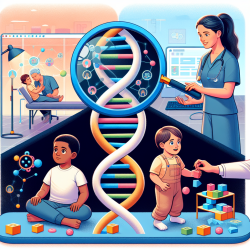As practitioners in the field of special education and therapy services, it is crucial to stay informed about the latest research and strategies that can enhance our work. A recent research article titled "International Organizations and Their Approaches to Fostering Development" provides valuable insights into how international organizations like the World Health Organization (WHO) and the World Bank approach health and development. By understanding these approaches, practitioners can refine their skills and contribute more effectively to their fields.
The Role of WHO and World Bank in Health and Development
The WHO and the World Bank are two dominant actors in global health and development. The WHO views health as a human right and focuses on health outcomes as both inputs to and results of development. Conversely, the World Bank emphasizes macro-economic growth as a precursor to enhancing human capabilities. Understanding these perspectives is essential for practitioners aiming to integrate global strategies into their practice.
WHO's Approach: Health as a Human Right
The WHO's approach is rooted in the belief that health is an intrinsic human right. This perspective emphasizes that improving health outcomes is not only a goal but also a means to achieve broader development objectives. Practitioners can adopt this mindset by prioritizing health outcomes in their interventions, ensuring that they contribute to both individual well-being and broader societal development.
World Bank's Approach: Economic Growth as a Catalyst
The World Bank's approach focuses on economic growth as a catalyst for improving health outcomes. By investing in macro-economic stability, countries can create environments where health improvements naturally follow. Practitioners can learn from this approach by advocating for policies that support economic growth alongside their health-focused initiatives.
Implementing Research Outcomes in Practice
The research highlights several successful programming efforts by these organizations. For instance, efforts to improve primary care have significantly enhanced child health outcomes globally. Practitioners can implement similar strategies by focusing on primary care improvements within their communities.
- Focus on Primary Care: Prioritize interventions that improve access to primary care services, particularly for vulnerable populations such as children under five.
- Advocate for Economic Policies: Support policies that align with economic growth objectives while also emphasizing health improvements.
- Engage in Multi-Sectoral Approaches: Collaborate with other sectors to address social determinants of health effectively.
By integrating these insights into their practice, therapists and educators can enhance their effectiveness and contribute to global development goals.
To read the original research paper, please follow this link: International Organizations and Their Approaches to Fostering Development.










